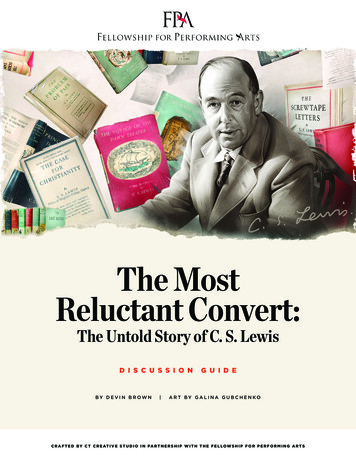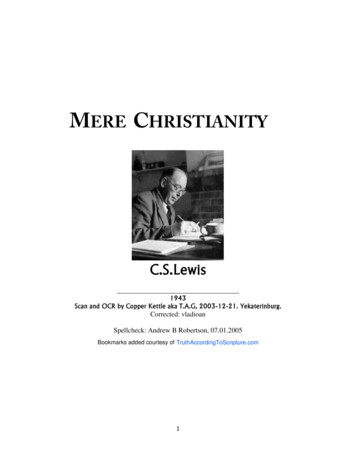
Transcription
The MostReluctant Convert:The Untold Story of C. S. LewisD I S C U S S I O NBY DEVIN BROWN G U I D EA R T BY G A L I N A G U B C H E N KOC R A F T E D B Y C T C R E AT I V E S T U D I O I N PA R T N E R S H I P W I T H T H E F E L L O W S H I P F O R P E R F O R M I N G A R T S
1. “When I was an atheist ”These are Lewis’ first words in the film. Clive Staples Lewis was born in 1898 and died,a week before his 65th birthday, on November 22, 1963. From the time he was fourteenuntil his early thirties, Lewis was an atheist, someone who does not believe in God. Hewas also a materialist, someone who believes that nothing exists besides physical matter.In the 1940s, Lewis gave a series of talks on the BBC that later became one of his mostfamous books, Mere Christianity. Before the second set of talks, Lewis told his radioaudience:It’s not because I’m anybody in particular that I’ve been asked to tell you whatChristians believe. In fact it’s just the opposite. They have asked me, first ofall because I’m a layman and not a parson, and consequently they thought Imight understand the ordinary person’s point of view a bit better. Secondly, Ithink they asked me because it was known that I’d been an atheist for manyyears and only became a Christian fairly recently. They thought that wouldmean I’d be able to see the difficulties – able to remember what Christianitylooks like from the outside.FOR DISCUSSION Lewis was a recent convert. What are some things a recent convert might be able tosee that a lifelong Christian might not?LOOK DEEPERLewis knew what Christianity looked like from the outside and he knew what atheismlooked like from the inside. How might this be helpful as well in sharing the Gospel?2. “Look at the universe we live in.”The film opens in Oxford’s Museum of Natural History. As Lewis walks through agallery filled with skeletons from Earth’s past, he reflects on the world we humans areborn into. Considering the inevitable demise of organic life, he concludes, “Nature is asinking ship.”This setting, including the museum’s statue of Charles Darwin, provides the context forLewis to explore the argument from design. As we look at the apparent design that wefind in Nature, can we conclude that there must be a loving God? Given all the pain andsuffering in the world, Lewis decided that the evidence pointed in the opposite direction.FOR DISCUSSION Lewis would later find evidence for the Divine in our reason, our perception ofbeauty, our longing for something more and our morality. Where besides Nature doyou see evidence for God?THE MOST RELUCTANT CONVERT:THE UNTOLD STORY OF C. S. LEWIS2
LOOK DEEPERNear the end of this scene, Lewis raises a second question: If the universe is so bad,or even half so bad, how did humans ever attribute it to the work of a wise and goodcreator? If not from Nature, where did our idea of a loving God come from?3. “I lost my mother to cancer, had an estranged relationship withmy father and was in the trenches during the Great War.”Some people have the mistaken impression that Lewis did not experience the ordinary pains of life. He did. As we learn from the film, Lewis lost his mother at a youngage and had a complicated relationship with his father. He was sent to a series ofdreadful boarding schools and later became wounded in World War I.The horrors of the trenches in World War I led C.S. Lewis (Nicholas Ralph) to question God’s goodness,in The Most Reluctant Convert: The Untold Story of C.S. Lewis.FOR DISCUSSION In The Problem of Pain, Lewis asks why a loving, all-powerful God allows so muchsuffering in the world. Has this been a question you have wondered about? What doyou think the answer might be?LOOK DEEPERIn the foreword to Jack’s Life by Douglas Gresham, Christopher Mitchell makes thisobservation: “One of the most persistent misconceptions about the man C.S. Lewis isthat for the greater part of his life he lived safely cloistered away from the typical caresand burdens of normal everyday life. Such a portrayal is troubling simply because itis not true. In fact, anyone who knows the facts knows that it is far from the truth.”THE MOST RELUCTANT CONVERT:THE UNTOLD STORY OF C. S. LEWIS3
4. “The great loss that befell our family.”In Surprised by Joy, Lewis reports that he hopes to correct “one or two false notionsthat seem to have got about.” There was speculation that his mother’s death hadaffected Lewis’ religious beliefs. Near the end of chapter one, he sets the recordstraight, explaining: “My mother’s death was the occasion of what some (but not I)might regard as my first religious experience.”Flora Lewis died of cancer when Lewis was nine. The failure of Lewis’ prayers for herrecovery did not produce a loss of belief because there was no genuine belief there inthe first place. Lewis did not view God as Savior or even as Judge but merely as a sortof Magician who – if asked properly – would grant a request. After a proper request,the young Lewis expected this genie-like Magician to go back into his bottle untilneeded again.FOR DISCUSSION Do you think Lewis is alone in viewing God as more of a genie than Lord? What aresome ways that you have misunderstood who God is?LOOK DEEPERLewis ends chapter one of Surprised by Joy with this passage that is used in the film:“With my mother’s death all settled happiness, all that was tranquil and reliable,disappeared from my life. It was sea and islands now; the great continent had sunklike Atlantis.” Later in life, Lewis found new security but not because life becamesecure; faith in God made it possible to find happiness despite loss. How has yourfaith helped you weather the losses in your life?5. “At fourteen I ceased to be a Christian.”In chapter four of Surprised by Joy, Lewis begins his account of the new school he isattending by telling us that he made his first real friends there. Then he announces,“But there, too, something far more important happened to me.” What could be moreimportant than making friends? Lewis tells us: “I ceased to be a Christian.”Lewis reports, “Little by little I became an apostate” in this section of the film. One ofthe biggest factors in Lewis’ loss of faith was the lack of guidance from older, matureChristians. Left on his own to struggle with life’s big questions, Lewis stumbled out offaith and into serious atheism that lasted until his early thirties.FOR DISCUSSION Do you think Lewis is fair to attribute his loss of faith to a lack of mature Christianspresent in his life? How have older Christians helped guide you in your faith journey?THE MOST RELUCTANT CONVERT:THE UNTOLD STORY OF C. S. LEWIS4
LOOK DEEPERHere Lewis says that he became an apostate not all at once or dramatically but littleby little. In letter twelve of The Screwtape Letters, Screwtape explains, “Indeed thesafest road to Hell is the gradual one – the gentle slope, soft underfoot, withoutsudden turnings, without milestones, without signposts.”Along Oxford’s beautiful Addison’s Walk, C.S. Lewis (Nicholas Ralph, right) and his friend J.R.R. Tolkien (Tom Glenister)discuss Jesus as the myth that became fact in The Most Reluctant Convert: The Untold Story of C.S. Lewis.6. “One of the worst acts of my life.”On Sunday, December 6, 1914, Lewis went home to St. Mark’s in Belfast to commitwhat he confesses to being one of the worst acts of his life. Fearing to speak upagainst his father’s wishes, Lewis, who was now sixteen and a staunch atheist, wasconfirmed as a member of the Church of Ireland. Cowardice drove him into hypocrisy,he reports in Surprised by Joy, and hypocrisy into blasphemy.FOR DISCUSSION Lewis found it hard to admit his lack of faith to his father. Have there been timeswhen you struggled to admit a realization about your faith to family members?LOOK DEEPERIn Surprised by Joy, Lewis states it would have been impossible to explain why he didnot want to be confirmed. His father would have resorted to arguing the beauty ofthe Authorized Version of the Bible, the beauty of Christian tradition, sentiment andcharacter. Why is it hard to argue with the beauty of the Christian tradition? Is theresomething about beauty that draws people in ways rational arguments do not?THE MOST RELUCTANT CONVERT:THE UNTOLD STORY OF C. S. LEWIS5
7. “I call this desire Joy.”In this scene, Lewis introduces his concept of Joy – always spelled with a capital “J” –a longing for something just out of reach. Lewis would later recognize this unsatisfieddesire as a longing for Heaven.FOR DISCUSSION Have you ever had an experience of what Lewis calls Joy? If so, how would youdescribe it? In Mere Christianity, Lewis makes this claim which is heard later in the film: “If Ifind in myself a desire which no experience in this world can satisfy, the most probable explanation is that I was made for another world.” How would you respond?LOOK DEEPERIn the Problem of Pain, Lewis offers this observation about Joy: “Tantalizing glimpses,promises never quite fulfilled, echoes that died away just as they caught your ear.But if it should really become manifest you would know it. Beyond all possibility ofdoubt you would say, ‘Here at last is the thing I was made for.’”8. “It was here I discovered Chesterton.”Lewis arrived at the front line in France on November 29, 1917 – his nineteenth birthday.Two months later he came down with trench fever and was sent to the hospital where hepicked up a book by G.K. Chesterton, who would become a lasting influence in his life.FOR DISCUSSION It seemed as though by chance that Lewis picked up a book by Chesterton. Can youthink of a time when “chance” played a significant role in your life?LOOK DEEPERYou may have heard it said that someone who wishes to remain a sound Christianshould be careful of his reading. Looking back on the events of his life in Surprised byJoy, Lewis turns this around and writes: “A young man who wishes to remain a soundAtheist cannot be too careful of his reading.”9. “Do you believe that logic and reason bring forthindisputable truth?”In the film, Lewis considers how we can trust our minds if all knowledge and thoughtis merely the accidental by-product of atoms colliding inside our skulls. This questionis at the heart of the argument from reason.THE MOST RELUCTANT CONVERT:THE UNTOLD STORY OF C. S. LEWIS6
Nicholas Ralph – the breakout star of PBS Masterpiece’s All Creatures Great and Small – plays C.S. Lewis as a young man, whoearned a rare “triple first” at Oxford then was admitted as a fellow in The Most Reluctant Convert: The Untold Story of C.S. Lewis.FOR DISCUSSION If physical matter is all there is and human life simply results from random chance,then our thoughts are just chance arrangements of atoms inside our heads. Lewissaid he could no more believe this about his thoughts than he could scratch his earwith his big toe. What about you? After abandoning Materialism, Lewis went through several stages on his way tobelieving in God. The first step was a philosophy called Idealism, where he believedin something he called the Absolute. Have you gone through stages on your journeyof faith? If so, how would you describe them?LOOK DEEPERLewis did not invent the argument from reason. In a 1946 letter written to OxfordMagazine, he refers to it as a “venerable philosophical chestnut” and comments thatthere are “more classical forms of the argument than mine.” Chesterton’s Orthodoxypresents one version of the argument from reason. Philosopher Alvin Plantinga iscurrently doing work in this area.10. “Rum thing, looks as if it really happened once.”In the diary entry for April 27, 1926, Lewis notes that a colleague named Weldon, whotaught philosophy, stopped by his rooms for a chat that went late into the night. “Wesomehow got on the historical truth of the Gospels,” Lewis records. This conversationappears to be the one Lewis refers to in Surprised by Joy, where he describes a visitfrom a militant skeptic who remarked, “All that stuff of Frazer’s about the Dying God.Rum thing. It almost looks as if it had really happened once.”THE MOST RELUCTANT CONVERT:THE UNTOLD STORY OF C. S. LEWIS7
FOR DISCUSSION For some people, evidence for the truth of the Gospels plays a significant rolein their acceptance of Christ. For some, a personal encounter with Jesus plays acentral role. Others come to faith through both. What about you?LOOK DEEPERLewis’ late-night conversation with Weldon, coming as it did in 1926, did not at thispoint lead directly to his acceptance of Christianity and that final step did not happenuntil five years later in 1931. So why does Lewis include this episode here among thesteps that led him to believe in Theism? This admission coming from this particularperson forced Lewis to reexamine his position on what he thought was possible.11. “I chose to unbuckle.”The next step after Lewis’ acceptance of a philosophical God occurred in an unlikelyplace – on the bus as he was going home. In Surprised by Joy, Lewis writes that beforethe bus ride ended, he had chosen to open, unbuckle and loosen the rein. These aremetaphors but ones that suggest Lewis had been doing the opposite. Through an actof will, he had been closed off to something he wanted to keep at bay and had kept atight rein on where philosophical investigation might lead. He decided to be open tothe truth on the bus ride home no matter where it might go. And once Lewis let go ofthe reins, truth would take him to only one place.FOR DISCUSSION Has there been a time when you decided to let go of the reins and follow the truthwherever it took you?LOOK DEEPERIn Surprised by Joy, Lewis tells us that God would not close in on him without permission. On the bus ride up Headington Hill, Lewis gave permission. We find a similarscene in chapter eleven of The Great Divorce where the angel asks the man with thered lizard for his permission to kill the thing that has been holding him back. Onlyafter the man says yes does the angel act.12. “What I found appalled me, depth after depth ”Early in The Screwtape Letters, Screwtape offers Wormwood the following advice tokeep his human out of Heaven: “You must bring him to a condition in which he canpractice self-examination for an hour without discovering any of those facts abouthimself which are perfectly clear to anyone who has ever lived in the same houseTHE MOST RELUCTANT CONVERT:THE UNTOLD STORY OF C. S. LEWIS8
with him or worked in the same office.” Earlier in life, Lewis had been in this situation – a condition where he could not see his flaws. Now when he examines himself,his failings are visible, and what he sees appalls him.FOR DISCUSSION Have you ever been unable to see your own flaws? Why is it easier for us to see thespeck in someone else’s eye than the plank in our own?LOOK DEEPERIn The Voyage of the Dawn Treader, Eustace can finally see how dragonish he hasbeen. Desiring to change, Eustace – who has turned into a dragon— sheds the superficial layers of his dragon nature somewhat easily, without much pain or help. Thedeeper layers will be just the opposite. Eustace finds they are impossible to removeon his own. He cannot undragon himself and will need Aslan to do it for him.C.S. Lewis (Max McLean) reflects on his spiritual journey in The Most Reluctant Convert: The Untold Story of C.S. Lewis.13. “You may as well talk about the mouse’s search for the cat.”Some people talk about their search for God. For Lewis, it was very much the otherway around. God was searching for him, and Lewis, who above all wanted to be leftalone, did not like it – not at the time.FOR DISCUSSION Did you ever have the feeling that God was searching for you? Did you likethis feeling? In this scene, Lewis wonders whether God will be reasonable in his demands.Have you ever worried about whether God would be reasonable with you?THE MOST RELUCTANT CONVERT:THE UNTOLD STORY OF C. S. LEWIS9
LOOK DEEPERThe British author Francis Thompson wrote a famous poem titled “The Hound ofHeaven” in which the Divine relentlessly pursues the protagonist in the form of agreat hound. In Surprised by Joy, Lewis writes of “the steady, unrelenting approach ofHim whom I so earnestly desired not to meet.”14. “The most dejected and reluctant convert.”In this scene we come to one of the most famous lines Lewis ever penned: “Inthe Trinity Term of 1929 I gave in, and admitted that God was God, and knelt andprayed, perhaps that night the most dejected and reluctant convert in all England.”Lewis did not remain a dejected and reluctant convert but became a joyous Christian who was known for his laughter. This conversion, as Lewis explains, was toTheism, not Christianity. Lewis will later describe his conversion to Christianity ina very different way – neither dejected nor reluctant, but like someone who after along sleep becomes aware that he is now awake.FOR DISCUSSION Here Lewis finally admits that God is God, but he does so kicking, struggling,resentful, darting his eyes in every direction looking for a chance to escape. InSurprised by Joy, Lewis points to the Divine love that will accept a convert even onsuch terms. Why do you think God is willing to do this?LOOK DEEPERAlister McGrath argues that Lewis may have got the date wrong here and that hisconversion to Theism took place in Trinity Term of 1930, not 1929. You can find hisreasoning in chapter six of his biography of Lewis.15. “Either this man was and is the Son of God or else he is a liar,a lunatic or a fraud.”This scene comes from Mere Christianity where Lewis writes: “I am trying here toprevent anyone saying the really foolish thing that people often say about Him: ‘I’mready to accept Jesus as a great moral teacher, but I don’t accept His claim to be God.’That is the one thing we must not say. A man who was merely a man and said thesort of things Jesus said would not be a great moral teacher. He would either be alunatic – on the level with the man who says he is a poached egg – or else he wouldbe the Devil of Hell.”THE MOST RELUCTANT CONVERT:THE UNTOLD STORY OF C. S. LEWIS10
FOR DISCUSSION Do you know someone who believes that Jesus was nothing more than a greatmoral teacher? If so, what is your response to them? Do you agree with Lewis’ statement that Jesus is either the Son of God or else he isa liar, a lunatic or a fraud?LOOK DEEPERThis passage from Mere Christianity is often called the Liar, Lunatic, Lord Trilemma.Some people mistakenly suggest that Lewis seems to have missed a fourth possibility – that Jesus was only a legend who never said these things at all. Notice that Lewisbegins with accepting that Jesus was a great moral teacher, not just a myth that various people made up.C.S. Lewis’ (Nicholas Ralph, center) discussing Jesus as liar, lunatic or Lord with J.R.R. Tolkien (Tom Glenister, left) andHugo Dyson (David Shields) in The Most Reluctant Convert: The Untold Story of C.S. Lewis.16. “Like a man after a long sleep becomes aware he is now awake.”When Lewis set out with his brother for Whipsnade zoo, he did not believe that JesusChrist is the Son of God. When they arrived, he did. Lewis tells us in Surprised by Joythat he did not spend the journey in thought or great emotion, but it was more likewhen a man who has been sleeping a long time becomes aware that he is now awake.FOR DISCUSSION People come to faith in many different ways – some as a result of great emotion,some as a result of great thought, and Lewis after a ride to the zoo. What was yourexperience of coming to faith like?LOOK DEEPERIn his Memoir of C. S. Lewis, Warnie describes his brother’s acceptance of Christ thisway: “This seemed to me no sudden plunge into a new life, but rather a slow steadyconvalescence from a deep-seated spiritual illness of long standing.”THE MOST RELUCTANT CONVERT:THE UNTOLD STORY OF C. S. LEWIS11
17. “There are no ordinary people.”“There are no ordinary people. You have never met a mere mortal. Nations, cultures,arts, civilizations – these are mortal, and their life is to ours as the life of a gnat.” Thesewords in the film come from “The Weight of Glory,” Lewis’ most famous sermon,preached in Oxford on June 8, 1941, at the University Church of St. Mary the Virgin.FOR DISCUSSION How does the Christian belief that all humans are created in the image of Godsupport Lewis’ statement that there are no ordinary people or mere mortals?LOOK DEEPERLewis prefaces his claim that there are no ordinary people or mere mortals withthese words:It is a serious thing to live in a society of possible gods and goddesses, toremember that the dullest and most uninteresting person you can talk tomay one day be a creature which, if you saw it now, you would be stronglytempted to worship, or else a horror and a corruption such as you nowmeet, if at all, only in a nightmare. All day long we are, in some degree,helping each other to one or other of these destinations.CONCLUSIONThe film ends with Lewis joining his fellow parishioners to receive communion,culminating his return to belief. Over the next three decades, Lewis would work tirelessly to assist others in their journey of faith – writing books, speaking on the BBCand sending personal replies to the hundreds of people who wrote to him for help.What was it that led C.S. Lewis to spend so much time and energy and risk hisscholarly reputation and comfortable academic life trying to encourage those whobelieved and reach out to those who did not?One answer is found in the depth to which Lewis truly believed the statement wehear near the end of the film – that every day, to some degree, we are helping thosearound us to one eternal destination or the other.May Lewis’ commitment to sharing the Gospel and the story of his life inspire our own.Devin Brown, Professor of English at Asbury University and author of A Life Observed:A Spiritual Biography of C. S. Lewis.THE MOST RELUCTANT CONVERT:THE UNTOLD STORY OF C. S. LEWIS12
until his early thirties, Lewis was an atheist, someone who does not believe in God. He was also a materialist, someone who believes that nothing exists besides physical matter. In the 1940s, Lewis gave a series of talks on the BBC that later became one of his most famous books, Mere Christianity. Before the










